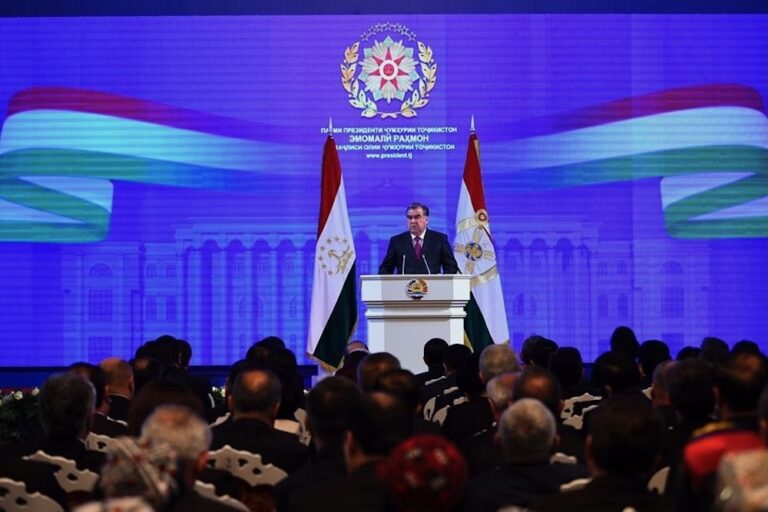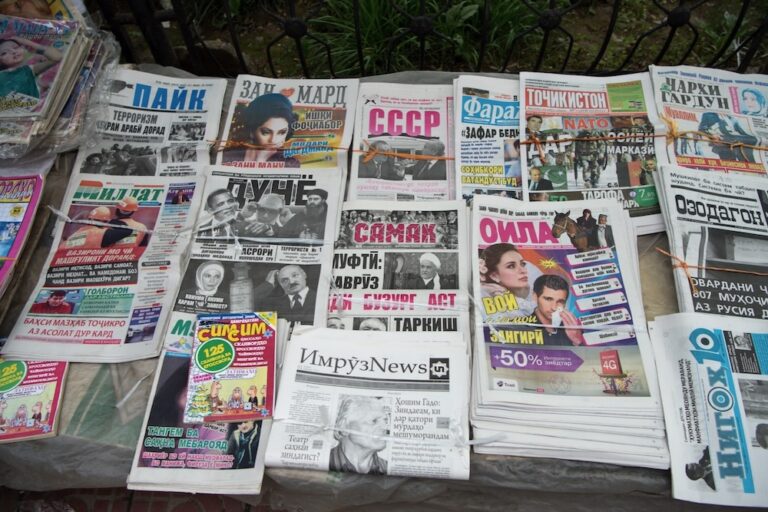(GDF/IFEX) – GDF is deeply disturbed by the revocation of Russian TV (NTV) correspondent Elena Masyuk’s (spelled “Massiuk” in IFEX alert of 27 July 1998) accreditation by the Foreign Ministry of the Republic of Tajikistan, and the announcement of her persona non grata status in the territory of the Republic of Tajikistan. **This alert contains […]
(GDF/IFEX) – GDF is deeply disturbed by the revocation of Russian TV (NTV)
correspondent Elena Masyuk’s (spelled “Massiuk” in IFEX alert of 27 July
1998) accreditation by the Foreign Ministry of the Republic of Tajikistan,
and the announcement of her persona non grata status in the territory of the
Republic of Tajikistan.
**This alert contains information further to IFEX alert of 27 July 1998**
On 17 July 1998, Igor Sattarov, head of the Information Department of the
Foreign Ministry of the Republic of Tajikistan, issued a statement
terminating Masyuk’s accreditation and declaring her persona non grata. He
did so under Article 6 (“Inadmissibility of freedom of expression abuse”) of
the Tajikistan Law on Press and other Mass Media. The statement also stated
that “in case of NTV attempting to whip up a so-called ‘Masyuk’s case’, the
Ministry (i.e. Tajik Foreign Ministry) will have to suspend the work of, or
close its Representative office, in the Republic of Tajikistan”.
The statement followed Masyuk’s reports of 22 and 23 July 1998, which
described the Tajik Foreign Ministry as “striving for the discreditation of
the Tajik leadership, aspiring to damage the politics of peaceful
construction of the society pursued by the government of the country, and
interference into internal affairs of the sovereign state.” The Tajik
Foreign Ministry regards Masyuk’s reports as having been “ordered.”
The Tajik Republic Law on Press and other Mass Media was adopted on 14
December 1990, before Tajikistan became independent in September 1992.
Article 33, which regulates conditions of accreditation, says that the Tajik
Foreign Ministry “can suspend accreditation in cases where journalists
violate the Constitution and other laws, systematically prepare and spread
misinformation on domestic and foreign policy of the Republic of
Tajikistan.” Unfortunately, depriving a journalist of accreditation cannot
be disputed in court.
Masyuk is the second Russian journalist to be declared persona non grata by
the Tajik Foreign Ministry in the last two years: in 1997, Igor Rotar,
Moscow correspondent for “Nezavisimaya Gazeta”, suffered the same fate. In
addition, the following Russian journalists have been persecuted in
Tajikistan by the authorities since 1994: Alexei Vasilevetsky (IMA Press
Agency), Dmitry Balburov (“Moscow News”), Yuri Snegirev (“Izvestiya”), Irada
Gusseinova (“Pravda-5”), Leonid Mlechin (Russian TV and radio company), Yuri
Kushko (“Obshchaya Gazeta”). On 28 March 1996, Victor Nikulin, correspondent
for Public Russian TV was killed in Dushanbe and the investigation of this
crime has not been completed yet (see IFEX alert of 29 March 1996). In
February 1997, four Russian journalists representing the ITAR-TASS and
Interfax agencies and NTV were detained as hostages for ten days.
Elena Masyuk is a brilliant journalist, well-known all over the world, and
her reports from Tajikistan bring additional attention of the world
community to this country. The deprivation of her accreditation, and in
particular the announcement of her persona non grata status, under a rather
awkward pretext badly formulated by the Foreign Ministry, will do much more
damage to the prestige of Tajikistan than her critical reports.
Recommended Action
Send appeals to the President:
inter-state obligations undertaken by the Republic of Tajikistan that allow
the journalists to have their own opinions concerning particular events
Appeals To
Emomali Rakhmonov,
President of the Republic of Tajikistan
Dushanbe, Tajikistan
Fax: +737 722 269 71
Please copy appeals to the source if possible.


